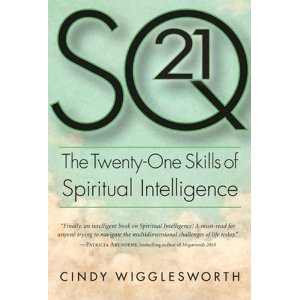
Photo Credit: HidingHeart via Compfight
The idea that success was based on more than just cognitive intelligence or IQ became popular when Daniel Goleman published his research and book on “Emotional Intelligence.” He showed that there are several other skill sets that are critical for human success and thriving that are not captured by IQ.
Not only do we need to be brain smart, i.e. have the ability to process information (including math and language) to find logical solutions to problems, we also need to learn how to relate to others by understanding our own emotions and those of the people we are in relationship with.
EI or EQ, as Emotional Intelligence is often called, includes the ability to understand one’s own emotions (self-awareness), to assess and respond to the emotional needs of others (empathy or social awareness), and then to use this emotional awareness to better manage one’s self and one’s relationships.
Personal and professional applications of EQ have been wildly popular since Goleman introduced his work over a decade below. Only just recently I wrote about Google’s training program, which is based on both mindfulness and EQ.
But according to leadership consultant Cindy Wigglesworth, EQ and IQ still don’t tell the whole story. There are actually four different kinds of intelligences that we should consider.*
The first is PQ or physical intelligence, which relates to understanding our bodies and how to maneuver and maintain them. I say this one comes first because this is the first intelligence we have to develop in childhood, and it also corresponds to fulfilling the foundational needs of hunger, thirst, etc. from the base of Maslow’s hierarchy of needs.
 The second intelligence, according to Wigglesworth, is cognitive intelligence or IQ, which becomes becomes the focus of school-age children as we learn logical thinking and language skills.
The second intelligence, according to Wigglesworth, is cognitive intelligence or IQ, which becomes becomes the focus of school-age children as we learn logical thinking and language skills.
Emotional intelligence or EQ becomes the focus in adult life as we begin to develop careers and families and realize the importance of relationship and social skills. EQ ties into the need for love and belonging in the middle of Maslow’s pyramid.
And this brings us to the fourth, and perhaps the most interesting of the four intelligences: spiritual intelligence or SQ. Wigglesworth believes that SQ becomes increasingly important as we strive (usually later in life) to reach self-actualization at the peak of Maslow’s hierarchy. Or as Wigglesworth says, it’s about “becoming fully human.”

![]() Photo Credit: Cornelia Kopp via Compfight
Photo Credit: Cornelia Kopp via Compfight
Wigglesworth defines SQ as “the ability to behave with wisdom and compassion, while maintaining inner and outer peace, regardless of the situation.” The definition may be best understood by considering some of the historical paragons of virtue that many of us have come to admire and revere such as Buddha, Gandhi, Jesus, or Mother Teresa: people who are recognized as acting with wisdom and compassion, even in the face of great challenges.
SQ may be the most important of the four intelligences, not only because it is what will ultimately bring us to express our full potential as human beings, but because it helps us bring out the best of our other abilities as well. Author Stephen Covey said, “spiritual intelligence is the central and most fundamental of all the intelligences, because it becomes the source of guidance for the other[s].”
Wigglesworth has created a tool (the “SQ21”) that people can use to assess their own SQ. And her book recommends some “spiritual weightlifting” exercises to help people develop their spiritual muscles.
Her work struggles with the inevitable challenges of tackling such an ethereal subject with an approach grounded in scientific inquiry. And some of her spiritual skillsets may prove too value-laden for a secular/scientific community to embrace (e.g. “sustaining faith” or “awareness of spiritual laws”.)
But I think it is a noble pursuit to aim the lens of science at the deepest questions of human existence. Wigglesworth’s work is intended to answer the question, “I want to be a good person—where do I start?” And while her tools and exercises might not answer this question definitively, they are “designed to begin a conversation and a learning journey.”
Amen to that.
—
References and recommended reading:
Wigglesworth, C. (2012). SQ21: The twenty-one skills of spiritual intelligence. Select Books.
*There are actually way more than four intelligences. Psychologist Howard Gardner identified nine possible intelligences in his work on “Multiple Intelligence Theory,” published in Scientific American in 1998.
by Jeremy McCarthy
Connect with me on facebook, twitter, or pinterest.
Now available: New e-book on The Psychology of Spas and Wellbeing.

Wonderful post, Jeremy. As I pursued my wellness coach certification through the Wellness Inventory (where we look at a holographic picture of a person’s emotional, physical and spiritual wellbeing), I realized that I had sadly neglected my own SQ and have been working on it since. I agree with Stephen Covey’s above observation and that it is the actualization of our SQ that allows us to become “fully human.” Wellness/wellbeing cannot be fully realized unless this dimension of our Selves is given its due.
I was going to post that Gardner has been down this road, and then saw your footnote. Gardner’s list of “intelligences” has expanded over the years from its original 7. More at the Wikipedia entry: http://en.wikipedia.org/wiki/Theory_of_multiple_intelligences
I guess I wonder – what is Wigglesworth adding? Another assessment tool? Clarification? Behaviours? I’m not sure that I’m seeing the value-add to this field. Help??
any psychometrics?
Thanks for adding the next book to my Amazon 1-click, Jeremy! I am like Lisa, interested in the assessment.
Cheers!
Lisa, as for your question about what does this add, I’m not sure of the answer. I don’t know enough about the existing literature on spirituality and I’ve never read Gardner’s work (but it looks fascinating) so I can’t say that anything here is new or revolutionary. I do think however, that most of what has been written about spirituality has been carved up into specific religious ideologies, so I enjoy seeing ideas of spirituality that are more secular and universal.
Jeremy – so I’m guessing there are no psychometrics. I’m thinking of writing a book on the “bullshit quotient”
I wasn’t sure what your question was. If you are asking if she uses psychometrics in her book, the answer is no. If you are asking if the scale is based on psychometrics, I’m not sure. She has a brief appendix in the book where she explains some of the steps she took to create and then validate the scale but it does not go into detail on the analyses used. I believe she says there is more information on her website if you want to learn more. Let me know when your book comes out.